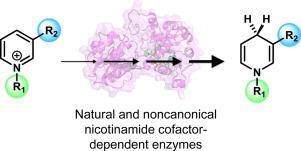Current Opinion in Biotechnology ( IF 7.1 ) Pub Date : 2020-09-18 , DOI: 10.1016/j.copbio.2020.08.005 Edward King 1 , Sarah Maxel 2 , Han Li 2

|
Nicotinamide cofactors enable oxidoreductases to catalyze a myriad of important reactions in biomanufacturing. Decades of research has focused on optimizing enzymes which utilize natural nicotinamide cofactors, namely nicotinamide adenine dinucleotide (phosphate) (NAD(P)+). Recent findings reignite the interest in engineering enzymes to utilize noncanonical cofactors, the mimetics of NAD+ (mNADs), which exhibit superior industrial properties in vitro and enable specific electron delivery in vivo. We compare recent advances in engineering natural versus noncanonical cofactor-utilizing enzymes, discuss design principles discovered, and survey emerging high-throughput platforms beyond the traditional 96-well plate-based methods. Obtaining mNAD-dependent enzymes remains challenging with a limited toolkit. To this end, we highlight design principles and technologies which can potentially be translated from engineering natural to noncanonical cofactor-dependent enzymes.
中文翻译:

工程天然和非经典烟酰胺辅因子依赖性酶:设计原理和技术开发。
烟酰胺辅助因子使氧化还原酶能够催化生物制造中的许多重要反应。数十年的研究重点是优化利用天然烟酰胺辅因子的酶,即烟酰胺腺嘌呤二核苷酸(磷酸盐)(NAD(P) + )。最近的研究结果重新激发了人们对工程酶的兴趣,以利用非经典辅因子,即 NAD + (mNAD) 的模拟物,它在体外表现出卓越的工业特性,并在体内实现特定的电子传递。我们比较了天然酶与非经典辅因子利用酶工程的最新进展,讨论了发现的设计原理,并调查了传统 96 孔板方法之外的新兴高通量平台。使用有限的工具包获得 mNAD 依赖性酶仍然具有挑战性。为此,我们重点介绍了可以从工程天然酶转化为非规范辅因子依赖性酶的设计原理和技术。











































 京公网安备 11010802027423号
京公网安备 11010802027423号